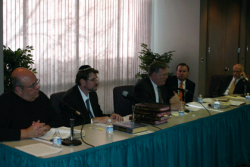Panel discusses reconciling religious values with professionalism

SALT LAKE CITY —The blending of spiritual beliefs with professionalism, civility and professional responsibility was the focus of the first Religion and Law panel discussion presented by the St. Thomas More Society of Utah. The St. Thomas More Society is a new organization for lawyers, judges, and members active in the legal and law enforcement professions. It is under the sponsorship of the Catholic Diocese of Salt Lake City, and welcomes people of all faiths. The panel’s goal was to bring lawyers and judges together to discuss legal issues from a religious perspective, said Ron Yengich, an attorney who is one of the founding members of the St. Thomas More Society. More than 100 attorneys and judges from throughout Salt Lake City and Provo attended the discussion, held Nov. 5 at the Law and Justice Center. W. Cole Durham, Jr., director of the International Center for Law and Religion Studies at the J. Reuben Clark School of Law at Brigham Young University, served as moderator. Among the panel members was Father Michael Sciumbato, pastor of Our Lady of Guadalupe Church in Salt Lake City and a member of the Utah State Bar who practiced law for several years before becoming a priest. Alan Bachman, assistant Utah Attorney General, also served on the panel. A member of the Jewish community, he is the Tribute chairman for the Salt Lake Interfaith Round Table and Interfaith representative for Congregation Kol Ami. A third panel member was Michael Lee, a partner at Howrey LLP. He is a member of the Church of Christ of Latter-day Saints and former counsel to former Governor Jon Huntsman. Rounding out the panel was former Chief Justice of the Utah Supreme Court Michael Zimmerman. He is now a partner at Snell and Wilmer, and vice abbot and sensei at the Kanzeon Zen Center. During the discussion, Durham said the legal profession is quite different because lawyers are expected to educate their clients regarding legal standards and judges reinforce this whenever clients are in the courtroom. Unconditional love should be the basis for relationships, Fr. Sciumbato said. "This is what we should be about in interpersonal dealings as attorneys, friends, as Catholics, or whatever religion. Love is patient, kind, not jealous, it does not put on airs, and does not rejoice over wrongdoing, but rejoices only in the truth. I think this should be a standard we should embrace as attorneys and be people of integrity." Bachman said legal practice needs a paradigm shift to allow attorneys to follow their religion while continuing to do their jobs. "The Torah begins and ends with kindness," he said. "In our legal profession we face people who are angry at each other, and we approach a higher level of kindness, and we reach above our natural inclination and try to create a healing as opposed to multiply that anger. Advocacy is a major role in Judaism. When Moses was dealing with the people who were angry in the desert and talks to God, God said, ‘Because of the words you said Moses, I will not kill the people.’ That is our job – to change the world." Lee said one of the things he enjoys about the practice and study of law is that in most instances and legal disputes, the law provides an answer. "I need God every day of my life," he said. "So as lawyers, we are not entitled to exercise any degree of power over another person even though we practice law and possess knowledge and skills about the law. That power has to be exercised only through principles consistently with gentleness, love, and faith. Even when you find yourself in a contentious position, you must express love to that person not withstanding the affects. If we were to approach the practice of law that way, it would be a lot easier for all us to comply with the rules." Zimmerman said he was raised a Presbyterian, but now practices Zen Buddhism. "Lawyers are advocates for their clients and are not to judge their clients’ views," he said. "The judge or jury is neutral. The lawyer advocates their client’s position and the neutral decides. Whatever the neutral decides is just and fair. Therefore, the lawyer can’t participate in the process without being a moral agent as long as he or she follows the rules. But the fact is, 95 percent of everything we do, does not have neutral involved. I think we subtly incorporate an adversary system excuse so we can do things that would otherwise create moral dissonance for us internally. That moral dissonance creates our dissatisfaction with the practice and us succumbing to the excuse creates our conduct." The process continued with a question and answer period for the panel by the moderator. The panel also answered questions from the audience.
© Copyright 2025 The Diocese of Salt Lake City. All rights reserved.

Stay Connected With Us